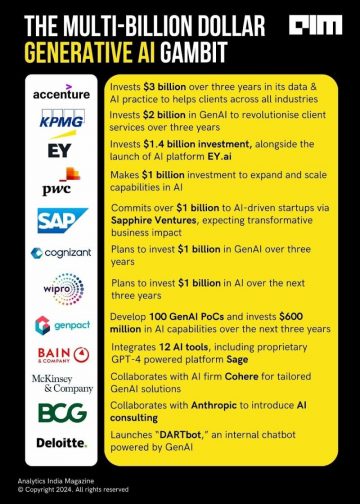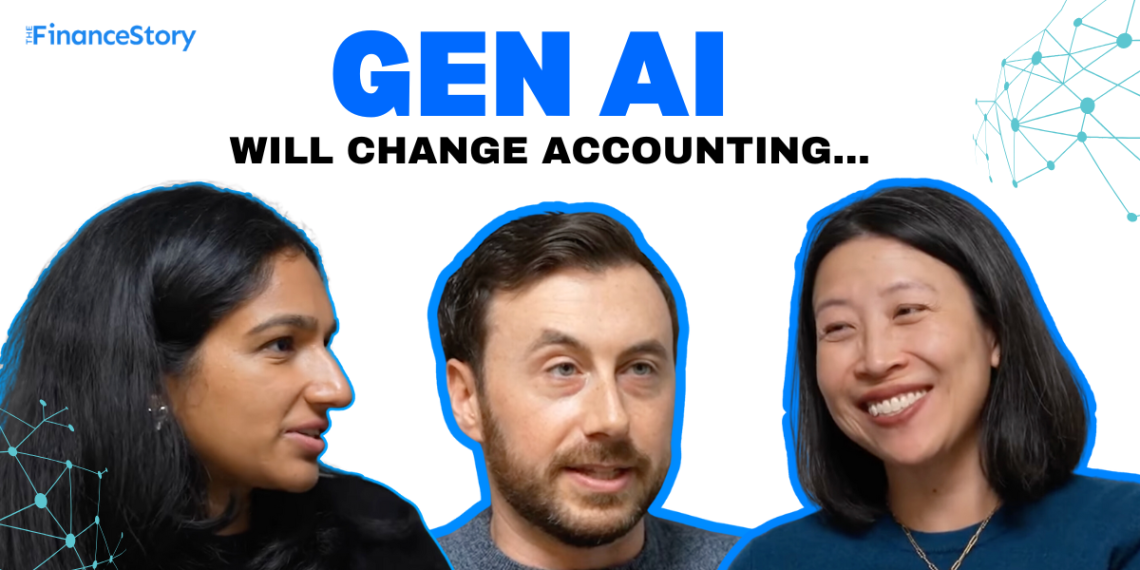- Could AI revolutionize accounting, tax, and finance?
- Seema Amble and Marc Andrusko from a16z, a VC fund with $44B in assets, recently discussed exactly this in their podcast.
- Here’s a quick breakdown and the original article for your review!
Urgency for accounting firms to adopt AI?
As we all know the US faces a huge crisis in accounting:
- 75% of senior accountants are set to retire in the next decade.
- Younger professionals aren’t filling the gap – fewer are entering the field and interest in accounting is dwindling.
The pressure is mounting for accounting firms to find solutions fast.
To survive, firms must turn to AI…
With billions of dollars pouring into AI-driven solutions, the race is on to transform the industry before it’s too late!

GenAI can transform accounting workflows…
Luckily, genAI has hit the scene…And corporate finance and accounting workflows should benefit greatly from its capabilities.
It is, however, important to be prescriptive about where specifically this new wave of LLM-based AI can help.
At their core, LLMs are best at working with natural language. They are adept at summarizing research, answering questions, and delivering information!
What they lack (for now!) is the ability to do complex calculations and quantitative analyses — two skills crucial to the accounting profession.
Despite this, accounting workflows are still ripe for disruption!
After all – Fields like bookkeeping, accounting, tax preparation, and auditing involve many repetitive and formulaic tasks – that could greatly benefit from generative AI’s ability to improve efficiency and save time.
Use cases where AI can solve
In the podcast and article, Seema from A2z mentioned that –
Finance and accounting cover various specialized areas like bookkeeping, tax prep, auditing, and CFO services.
Across these fields, certain key tasks are common and essential, regardless of the speciality.
They are:
1. Data Collection and Reconciliation
Finance professionals and accountants often need to gather data from many sources:
- Bank statements
- General ledger
- Commerce platforms
- AP and AR tools
- Business systems of record
This data is used to consolidate performance metrics and resolve any discrepancies. This process, called reconciliation, often requires input from various teams (e.g., invoice approvers or vendor managers).
Before LLMs, Open Banking and universal APIs made it easier to import data for reconciliation.
- Small businesses dedicate around 15 hours weekly to reconciliation tasks.
- Larger companies rely on business process outsourcing (BPO) for additional support.
But now, with LLMs: LLM-powered software can extract data from unstructured formats (like contracts, receipts, and invoices), making reconciliation much easier.
- In enterprises, LLMs help centralize finance data, and powerful search and matching functions streamline error-checking and term identification.
- For SMBs, instead of manually contacting colleagues (like Becky from Procurement or Ryan in FP&A), accountants can use an AI copilot trained on company data to resolve issues quickly.
The AI can also generate an audit trail for transparency. Examples of companies offering these tools include:
- Basis: AI copilot that matches payables to bank cash flow.
- Klarity: Automates document review and extraction for enterprises.
2. Research and Compliance
Research is an important use for LLMs in accounting. Here’s how they can help:
CPAs’ tasks: CPAs need to decide how to classify and report revenue and expenses for tax purposes. For example:
- Charitable donations may be deductible.
- R&D expenses may qualify for tax credits.
Key resources: Accountants use several codes and standards, including:
- Tax codes (vary by jurisdiction)
- Accounting rules (e.g., ASC 606 for revenue recognition)
- SEC filings and prior working papers
- Guidance documents from the Big Four accounting firms
Before AI: CPAs would search through databases or consult manuals and colleagues to find answers.
After LLMs: AI copilots trained on this data can quickly provide accurate answers and even learn firm-specific judgment calls.
Startups: Companies like SPRX, Neo.tax, and Materia are using AI to offer solutions for R&D tax credits and better research guidance.
3. Automating Report Generation and Filing
After categorizing client data, practitioners must analyze it and generate internal and external reports, such as:
- Journal entries for ERP systems
- Disclosure reports
- Audit checklists
- Technical accounting memos for tax filing
Much of this can now be automated. For example, while genAI may not be needed to fill out boxes on a tax form, it can be extremely useful for generating summaries.
- Custom Style: Professional services firms often have a unique style for their documents, communication, and tone. LLMs can be trained to summarize information in that specific style.
- Audit-Ready Reports: LLMs can create reports and checklists that match the format and tone of those previously written manually, ensuring they’re audit-ready.
This streamlines the report generation process, saving time while maintaining consistency and accuracy.
4. Enhanced Client Advisory
Client service practitioners have fairly self-explanatory jobs:
- Summarize key performance data for their clients (be they internal clients, in the case of in-house finance teams, or external clients, in the case of accounting firms),
- Answer ad hoc questions,
- Offer finance and tax optimization advice
Introducing GenAI into this equation is particularly interesting. GenAI can help in two key ways:
- Turning Transactions into Ongoing Relationships: Accountants want to move from just helping clients during tax season to offering ongoing advice throughout the year. With GenAI, they can provide monthly insights that clients may be willing to pay more for.
- Focusing on Higher-Value Work: For small businesses and startups that don’t have large finance teams, regular financial advice can be very useful. Tools like Black Ore help firms automate tasks like tax preparation, freeing up time for more valuable advisory work.
Despite its capabilities…
AI cannot replace two key aspects of professional services:
- Judgment: Complex decisions still require human expertise.
- Client Relationships: Building trust and delivering personalized advice remains the domain of seasoned professionals.
The big question: AI’s impact on billable hours
Just like Legal AI, Accounting AI could reduce billable hours by improving efficiency.
This has big implications for how AI companies target different departments and business units.
- Tax departments often charge clients based on hourly rates, so AI could challenge this model by getting the same work done faster.
- Auditors usually have fixed-fee engagements, meaning they aren’t concerned with hourly rates.
AI could enable firms to complete work faster while keeping client fees unchanged of course until competition and AI-driven pricing shake up the industry!
But will there be real challenges...
AI impacts grooming talent
- Although automating tedious tasks with AI is appealing from a cost-saving perspective, the junior staff, who do much of the grunt work, are essential for learning the ins and outs of the profession.
- A key factor influencing buying decisions at CPA firms is talent development!
- So for now, AI tools will likely augment the work of junior staff rather than replace them, as firms take pride in their training programs.
Senior professionals on being replaced!
- Senior accounting practitioners may hesitate to adopt GenAI, even though it can save significant time on manual tasks.
- Their concern lies in the possibility that AI could reduce their responsibilities or eventually replace them!

About Andreessen Horowitz (aka a16z)
Founded in Silicon Valley in 2009 by Marc Andreessen and Ben Horowitz, Andreessen Horowitz (aka a16z) is a venture capital firm.
It invests in seed to venture to growth-stage technology companies, across AI, bio + healthcare, consumer, crypto, enterprise, fintech, and games. a16z has $44B in assets under management across multiple funds.







